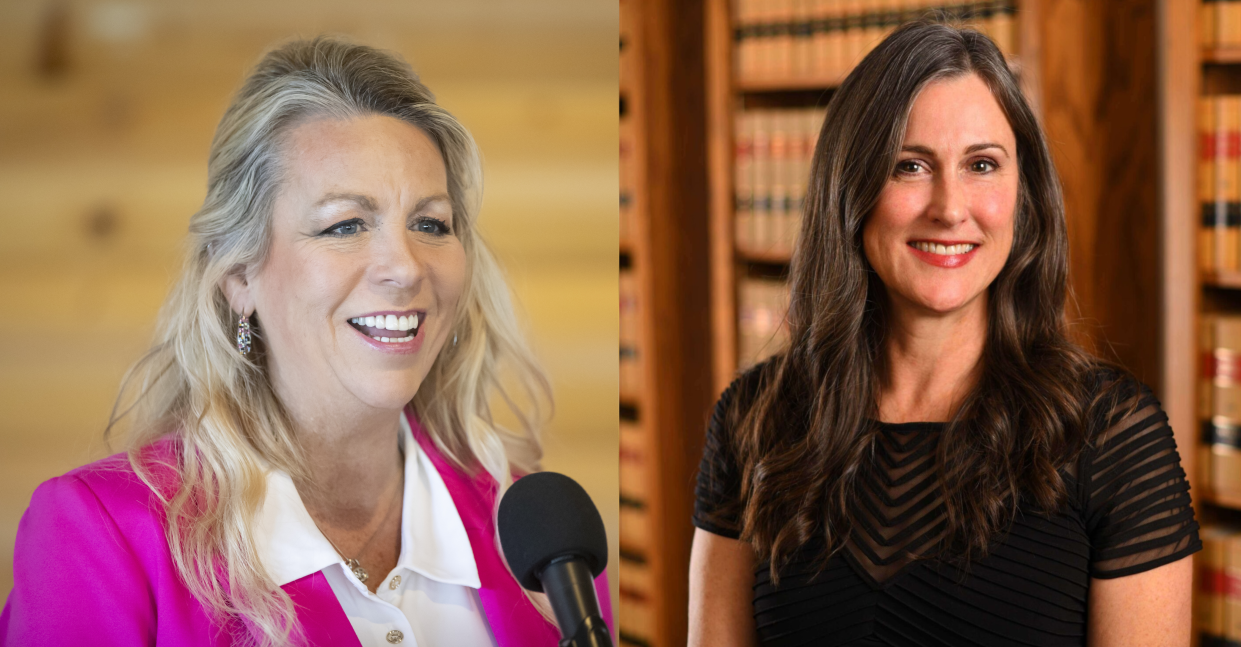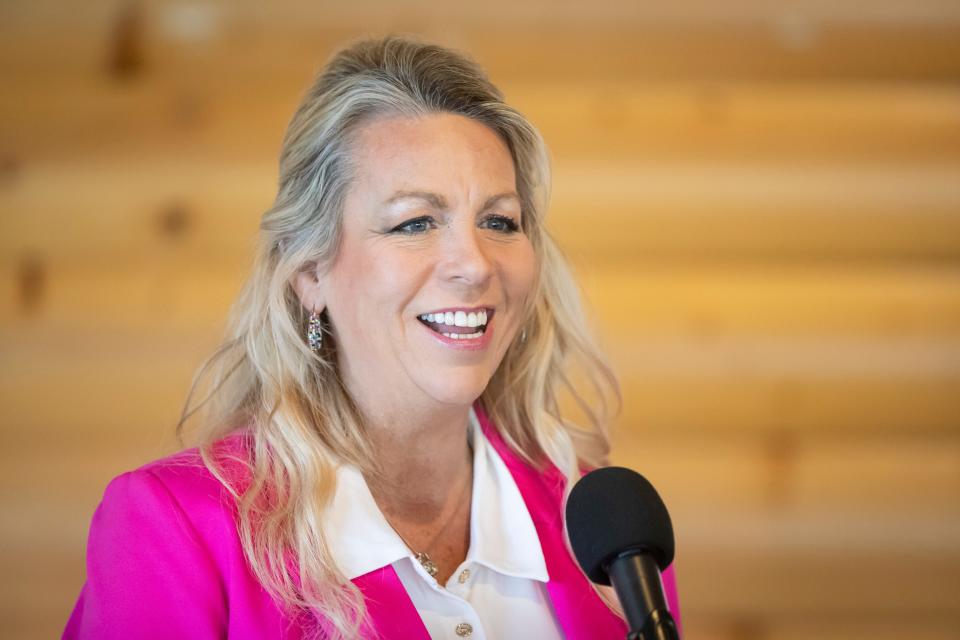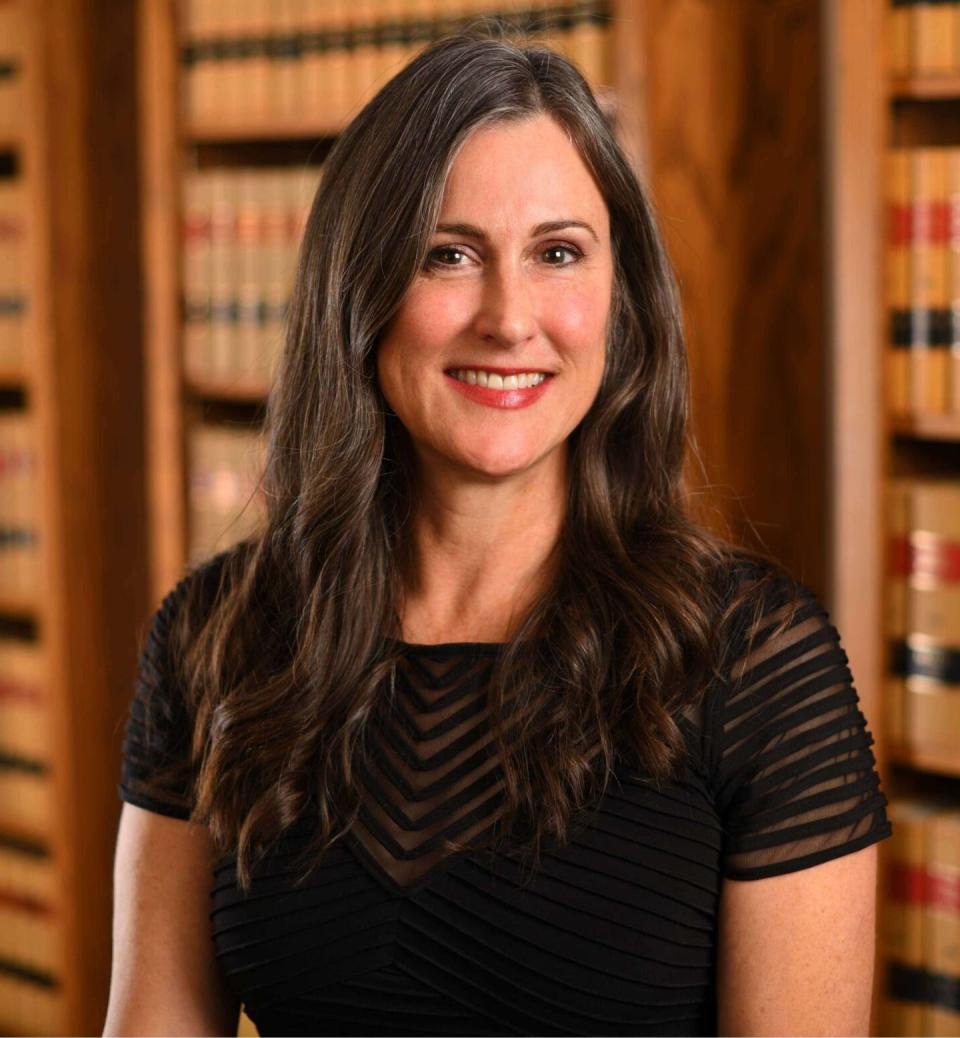Where they stand: Republicans DeSpain, Ryan Courser face off in bid to replace Rep. Val Hoyle

- Oops!Something went wrong.Please try again later.
- Oops!Something went wrong.Please try again later.
Two Republicans are set to face off in the May 21 primary election for Oregon's 4th Congressional District, seeking the party nomination for the second general election in the southwest Oregon district since the retirement of 36-year Congressman Peter DeFazio.
Monique DeSpain is a Eugene-based attorney and veteran who served as an Air Force colonel and JAG Officer. Amy Ryan Courser is an entrepreneur and former Keizer City Councilor who previously attempted congressional runs in other Oregon districts in 2020 and 2022.
On the issues, Ryan Courser is generally viewed as being a bit further to the right, although both are conservative.
DeSpain told the Register-Guard she doesn't want to change current reproductive health laws. Ryan Courser said she "is 100% Pro-life," and that she personally believes Oregon's abortion laws should be stricter but supports legislatures and citizens deciding state-level rules.
Both candidates criticized President Joe Biden and the Democrats' handling of the U.S.-Mexico border and said closing it was their top priority, while also saying they support citizenship paths for documented immigrants. But Ryan Courser said she supports "no amnesty" while DeSpain said she supports "commonsense asylum laws."
Both candidates have called for a photo ID requirement to vote in the name of election security. Ryan Courser has also called for removing DMV voter registration and requiring in-person voting.
Each said they would be the right candidate to unseat freshman Democratic Congresswoman Val Hoyle.
Amy Ryan Courser

Ryan Courser said she was the one who could beat Hoyle because of experience from her previous congressional runs. While she lost the 2020 election for Oregon's 5th Congressional District, she pointed out that she flipped Marion, Polk and Tillamook counties. Democrat Kurt Schrader won the majority of voters in all three in 2018 but leaned toward Ryan Courser in 2020. "I had three counties that I did extremely well in, and they were blue districts," she said.
Ryan Courser's background
Ryan Courser got her political start on the Keizer City Council. "When I got into politics, it's because I didn't like it. And I was angry at my city council," she said, saying she was motivated to run by frustration over a lack of a safe sidewalk, which she was able to get after some years on the council.
While on the council, Ryan Courser was willing to go against the other councilors. As an example of how she approaches governing, Ryan Courser highlighted her vote against the city's resolution opposing Measure 105, the 2018 ballot measure that sought to overturn Oregon's sanctuary state status. "I spent a lot of time going out into the community, having the conversations (and) I stayed true to my beliefs," she said.
Ryan Courser's campaign address is still in Keizer, outside Oregon's 4th District, but she told listeners at a Eugene and Springfield city club candidate forum that she's sold her home and she and her husband now in their RV which they take around Oregon's 4th District. "We are grassroots, 100% shopping, buying gas in the district, getting to know absolutely everyone," she said.
Priorities
Ryan Courser said her top priorities are to close the U.S.-Mexico border, improve the economy through deregulation, and reduce "polarization and the weaponization of our government," which in her view included measures such as pandemic lockdowns and former President Donald Trump's indictments.
U.S.-Mexico Border
"I believe that we need to shut our border," Ryan Courser said. She expressed similar views to DeSpain that closing the border was needed for security and would reduce the country's problem with fentanyl. "We have to, number one, protect our citizens in America first," she said.
Ryan Courser said she also supports immigration reform focused on providing citizenship to documented immigrants. "They worked hard to come and they did it the right way, and they did it legally," she said.
Economy
Like DeSpain, Ryan Courser saw overregulation as a challenge to economic prosperity. Ryan Courser differed in the solution and advocated for the federal government to take a smaller role.
"I am a big proponent of getting less government. (Getting) federal government out of the businesses and the lives of our citizens. So what that means to me is that we need to bring back the policies to the state legislature."
Ryan Courser highlighted pandemic safety measures as an example of overregulation. "We didn't support local businesses and we provided rules and regulations," she said. While she expressed disapproval of how Oregon handled these and other issues, she said she still saw these as issues the federal government should stay out of.
"I don't think federal government's the answer. I think the state's the answer and how we hold our officials accountable," she said.
Ryan Courser mentioned mental health, homelessness and joblessness as other issues that she believes are more the purview of the state government. She criticized Oregon's handling of these issues and like DeSpain criticized the "housing first" approach to addressing homelessness.
Polarization
"If we continue to move forward with the polarization and the weaponization of our government, it will alter our elections and our country for the rest of our lives," Ryan Courser said.
At the forum, Ryan Courser cited pandemic restrictions as one overly divisive measure she would have opposed in Congress, measures DeSpain also criticized in her interview with the Register-Guard. On her podcast Amy Across America, other measures Ryan Courser criticized as weaponizing government or being overly divisive include:
The indictments of former President Donald Trump.
The Democratic bills that Republican members of the Oregon legislature walked out over in 2023: bills aimed to restrict guns and protect abortion and gender-affirming care access for teens.
The open U.S.-Mexico border.
Monique DeSpain

"I can beat Val Hoyle," DeSpain said when the Register-Guard asked why voters should pick her over Ryan Courser. "I'm raising money. … It's kind of a sad thing, but it takes a lot of money to reach all the voters," she said. "I was working full-time in a job that I love, and now I'm full-time campaigning. When I work, I work really hard, and I usually accomplish what I'm trying to do."
Despain's background
DeSpain said she began getting involved in politics in 2019, shortly after she retired from 30 years in the military. She was an Air Force Colonel and a Judge Advocate General (JAG) Officer (military legal counsel). In 2019 she began volunteering with Lane County Republicans. There, she door-knocked for Alek Skarlatos, the Republican congressional nominee for the district in 2020 and 2022.
After her military service, DeSpain also started working in the law firm of Kevin Mannix, now a State Representative, R-Keizer. There she worked on the lawsuit that alleged Democratic Governor Kate Brown had overstepped her authority by reducing prison sentences.
During that work, she said she saw a "persistent attack on our criminal justice system by the left" which she aims to address in Congress. "I very much consider this (campaign) a continuation of my service to my country," she said, and has positioned herself as someone who's qualified to address public safety because of her military and law experience.
DeSpain's ideology
DeSpain described her ideology as three overarching priorities: public safety, economic prosperity and government transparency and accountability. In practice, this leads to positions such as wanting to close the U.S.-Mexico border, reduce regulation and permitting costs and give a closer eye to government spending.
Public safety
A highlight of the public safety priority involves closing the U.S.-Mexico border, which she and Ryan Courser expressed similar views on. "Some of (the migrants) hate our country and would like to destroy our way of life. And they're coming over our border. So that is my number one issue." DeSpain also attributed the increase in fentanyl addiction and deaths to the border, "fentanyl is not sprouting organically along the I-5. It's coming over the border."
DeSpain said she also supported immigration reform, but said it should not have to be tied to border security. "The obvious major burning issue is our border and securing the border, which is a separate issue from immigration reform … we need to reform that as well," she said.
Other public safety positions DeSpain outlined include support for Protecting our Communities from Failure to Secure the Border Act of 2023, which DeSpain said could be used to combat instances like camping in the Bureau of Land Management-governed West Eugene Wetlands, more medical personnel in jails, making it easier to have people committed to mental health institutions, and blocking federal funding cities that defund police.
Economy & deregulation
On the economy, DeSpain said that in Congress she would aim to improve conditions by reducing regulation. "In aiming for a prosperous economy, you have to reduce red tape," she said.
DeSpain highlighted development permits as an example. She said the high cost of these permits holds up things like the proposed Port of Coos Bay expansion and housing development and blamed these permitting costs and Oregon's land use regulations for creating the state's housing shortage.
"In the Portland area, to build, before you can even take a scoop of soil on a site for building a home can cost $100,000 in permits and regulations and all the red tape a builder has to go through," she said. "So, that really makes it a very undesirable investment."
DeSpain and Ryan Courser both said they saw overregulation as a problem but differed in what they saw as the federal government's role. DeSpain said she sees most of this regulation coming from state and local government, and that the solution could be using Congress' spending power to incentivize deregulation.
"If (state elected officials) want federal funding, I want them to have federal funding. All I want are results," DeSpain said, while talking specifically about housing production.
Government transparency & spending re-examination
For DeSpain, the transparency priority involves digging into government spending, especially in the nonprofit sector, and defunding the initiatives that aren't working. "We have nonprofits that I would argue are in it for profit," she said.
As one example, DeSpain and Ryan Courser both criticized the "housing first" model, and DeSpain said she believes all nonprofits in the homelessness sector should focus on addiction and mental health treatment.
"Recovery from addiction and illness is the only path to independent living and independent housing, and all programs in the homelessness, addiction, and mental health space must make recovery their mission," she said, while calling other programs enabling. "I would eliminate those organizations in this effort to eliminate drug addiction and help people get into recovery and into a purposeful life."
DeSpain said she would look for these and other federal funding on programs she believes are ineffective and cut that spending. "Name a government agency. They're wasting your money," she said, citing the troubled implementation of pandemic rental assistance in Oregon as one example. DeSpain said she's qualified to do this work because of the investigations she undertook as a prosecutor and JAG officer.
Alan Torres covers local government for the Register-Guard. He can be reached over email at atorres@registerguard.com or on X @alanfryetorres.
This article originally appeared on Register-Guard: Oregon Republicans Ryan Courser, DeSpain running for Congress against Hoyle

